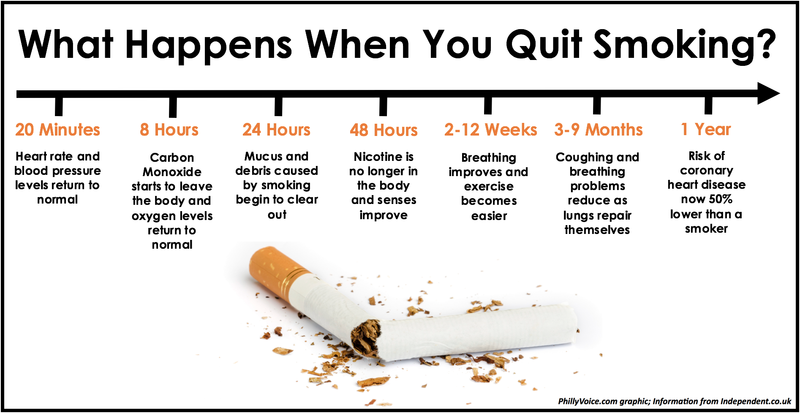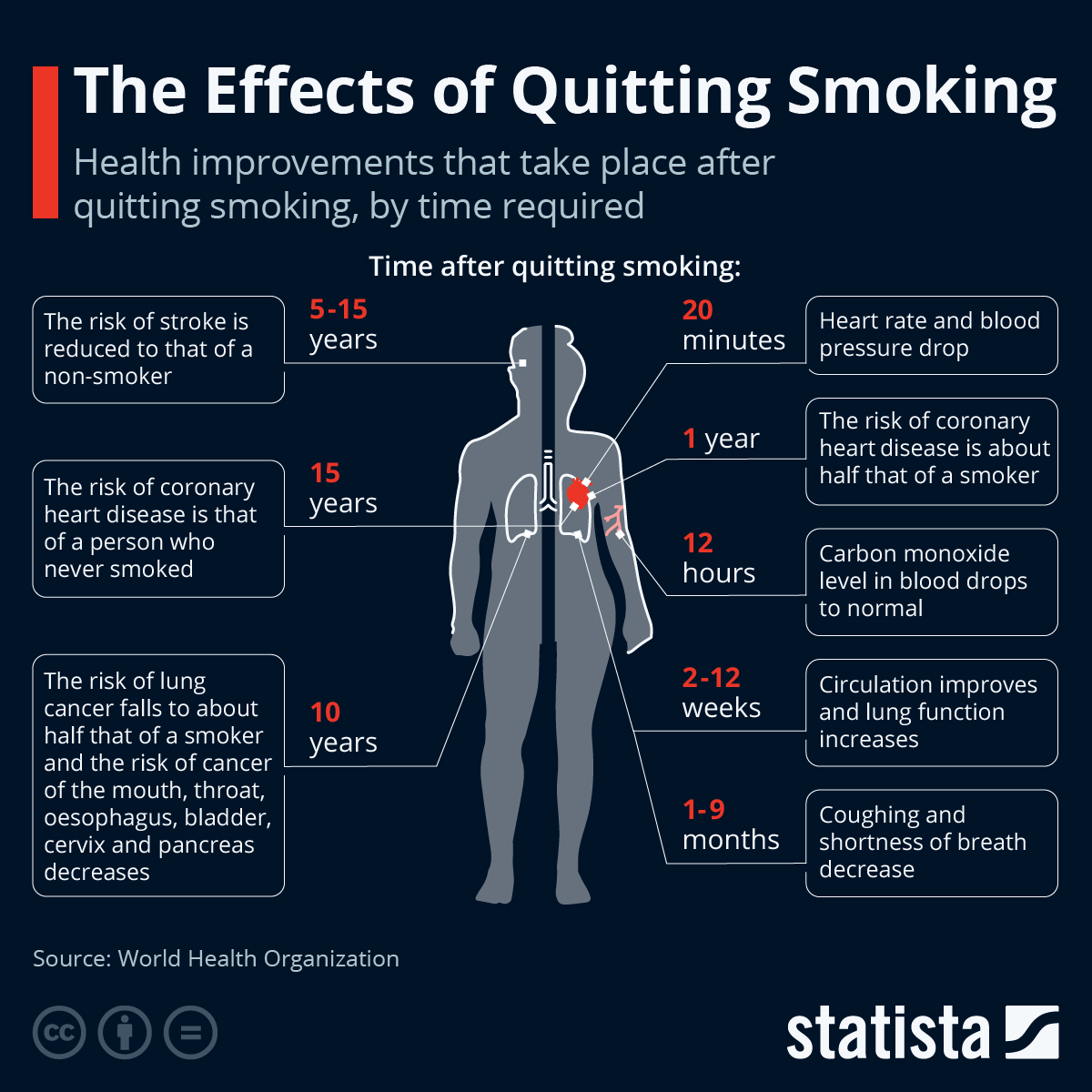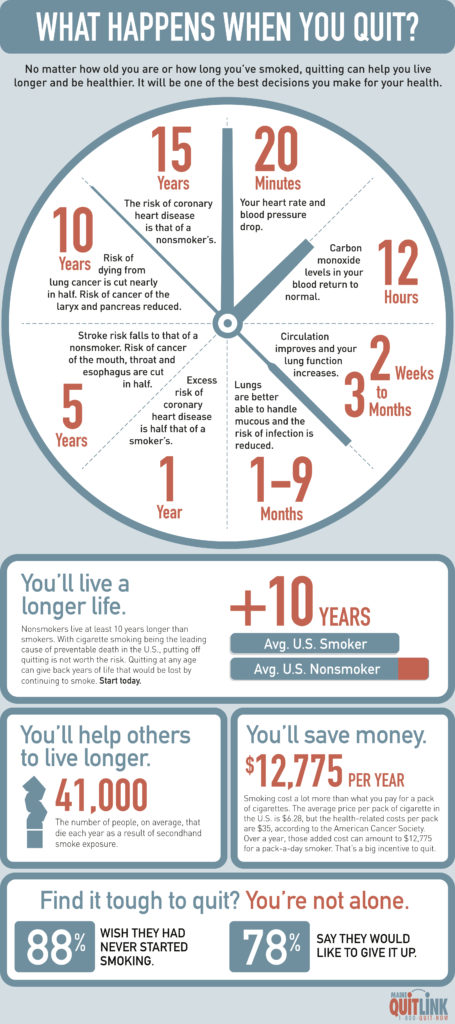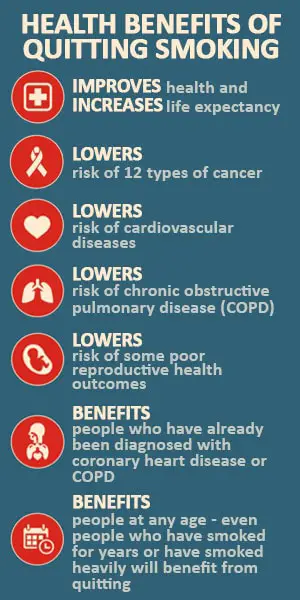Quitting smoking offers numerous health benefits, including improved lung function and reduced risk of cardiovascular diseases. When you quit smoking, your heart rate slows within six hours and your blood pressure stabilizes.
Additionally, within one day, your bloodstream becomes almost nicotine-free, carbon monoxide levels drop, and oxygen reaches your heart and muscles more efficiently. Long-time smokers may take longer for their lungs to heal, but quitting smoking can prevent further damage and improve breathing ability.
The benefits of quitting smoking extend to reducing the risk of diseases and increasing overall well-being. By quitting smoking, individuals can significantly improve their health and quality of life.
Immediate Effects Of Quitting Smoking
Within Hours: Heart Rate And Blood Pressure
Within six hours, your heart rate will slow down and your blood pressure will become more stable.
One Day Later: Nicotine And Carbon Monoxide Reduction
Within one day, your bloodstream will be almost nicotine-free, and the level of carbon monoxide in your blood will have significantly dropped.
Oxygen will be reaching your heart and muscles more easily, improving overall function.

Credit: www.issup.net
Short-term Health Improvements
Experience short-term health improvements by stopping smoking. Within hours, heart rate normalizes, blood pressure stabilizes, and oxygen flow increases, enhancing lung function and overall well-being. Quitting tobacco reduces inflammation, improves cardiovascular health, and decreases respiratory issues, leading to a healthier lifestyle.
Short-Term Health Improvements Quitting smoking can bring about a wide range of health benefits, both in the short-term and long-term. In this article, we will focus on the short-term health improvements that one can experience after quitting smoking. These short-term health benefits are the first signs that your body is responding positively to your decision to quit smoking. Respiratory Benefits One of the most significant short-term health benefits of quitting smoking is the improvement in respiratory function. Smoking damages the lungs, making it difficult to breathe and causing a persistent cough. However, within a few days of quitting smoking, the body starts to repair the damaged lung tissue, and the respiratory function improves. The bronchial tubes start to relax, making it easier to breathe, and the persistent cough gradually disappears. Enhanced Taste and Smell Smoking affects the sense of taste and smell, making it difficult to appreciate the flavors of food. However, within a few days of quitting smoking, the taste buds and olfactory nerves start to regenerate, and the sense of taste and smell improves significantly. This can lead to a renewed appreciation for food, making it more enjoyable and satisfying. Energy Levels Increase Another short-term health benefit of quitting smoking is the increase in energy levels. Smoking causes a decrease in oxygen levels in the body, which can lead to fatigue and lethargy. However, within a few days of quitting smoking, the oxygen levels in the body start to normalize, leading to an increase in energy levels. This can help you feel more alert and focused throughout the day. In conclusion, quitting smoking can bring about numerous short-term health benefits, such as the improvement of respiratory function, enhanced taste and smell, and an increase in energy levels. These benefits are just the beginning of the positive changes that you can experience by quitting smoking. It’s never too late to quit smoking and start enjoying a healthier, happier life.Long-term Health Benefits
Quitting smoking brings about numerous long-term health benefits, significantly improving overall well-being and reducing the risk of various serious health conditions. The positive impacts of smoking cessation are particularly pronounced in terms of the reduced risk of heart disease, lower cancer risk, and decreased stroke probability.
Reduced Risk Of Heart Disease
After quitting smoking, the risk of developing heart disease decreases steadily. In fact, within just a year of quitting, the risk of heart disease is already half that of a smoker. Over time, the risk continues to diminish, contributing to a healthier cardiovascular system.
Lower Cancer Risk
Quitting smoking significantly lowers the risk of developing various types of cancer, including lung, throat, mouth, and esophageal cancer. Over time, the body’s ability to fight off cancerous cells improves, reducing the likelihood of cancer development and progression.
Decreased Stroke Probability
By quitting smoking, the risk of experiencing a stroke diminishes over time. Blood circulation improves, reducing the likelihood of blood clots and blockages that can lead to a stroke. Over the long term, the probability of suffering from a stroke decreases, contributing to better overall health.
Psychological And Emotional Gains
Quitting smoking not only has physical health benefits but also contributes significantly to psychological and emotional well-being. The mental and emotional advantages of breaking the smoking habit are numerous and impactful.
Improved Mood And Mental Health
Quitting smoking can lead to improved mood and enhanced mental health. As the body adjusts to life without nicotine, individuals often experience reduced anxiety and depression. This can result in an overall boost in mental well-being, leading to a more positive outlook on life.
Increased Stress Tolerance
After quitting smoking, individuals may find that their ability to tolerate stress improves. Nicotine withdrawal can initially increase stress levels, but as the body adjusts to a smoke-free life, individuals often report feeling better equipped to handle stressful situations. This can result in enhanced resilience and mental toughness.
Enhanced Self-image
Giving up smoking can also lead to an enhanced self-image. Many individuals report feeling more confident and self-assured after quitting. This can lead to improved self-esteem and a more positive self-perception, contributing to overall emotional well-being.
Impact On Life Expectancy
Quitting smoking can have a profound impact on life expectancy. By breaking free from the harmful habit, individuals can significantly increase their chances of living a longer and healthier life. The health benefits of stopping smoking extend beyond the immediate improvements in lung function and cardiovascular health. Let’s delve into the statistics on longevity post-smoking and compare the life expectancies of smokers and non-smokers.
Statistics On Longevity Post-smoking
Research indicates that individuals who quit smoking by age 40 can add 9 years to their life expectancy compared to those who continue smoking. Even those who quit at age 60 can add 3 years to their life expectancy. These statistics underscore the remarkable impact that quitting smoking can have on longevity.
Comparative Analysis: Smokers Vs. Non-smokers
| Factor | Smokers | Non-Smokers |
|---|---|---|
| Life Expectancy | Shortened by an average of 10 years | Longer life expectancy |
| Risk of Chronic Diseases | Higher risk of lung cancer, heart disease, and stroke | Lower risk of developing chronic diseases |
| Quality of Life | Reduced quality of life due to health complications | Improved quality of life and overall well-being |
By comparing the life expectancies of smokers and non-smokers, it becomes evident that smoking significantly reduces life expectancy and increases the risk of chronic diseases. Non-smokers, on the other hand, enjoy a longer life expectancy and a lower risk of developing debilitating health conditions.

Credit: www.statista.com
Benefits To Skin And Appearance
Quitting smoking can have profound positive effects on your skin and appearance. Not only does it contribute to skin rejuvenation, but it also leads to significant improvements in oral health.
Skin Rejuvenation Post-smoking
After quitting smoking, the skin undergoes a remarkable rejuvenation process. The increase in blood flow and oxygen levels helps to restore the skin’s natural glow and elasticity. Wrinkles and fine lines caused by smoking tend to diminish, resulting in a more youthful and radiant complexion.
Improvements In Oral Health
Quitting smoking not only benefits the skin but also leads to notable improvements in oral health. Stained teeth often associated with smoking begin to regain their natural whiteness, enhancing the overall appearance of the smile. Additionally, bad breath and the risk of gum disease decrease, contributing to a healthier and more attractive oral appearance.
Economic Advantages Of Quitting
Aside from the many health benefits of quitting smoking, there are also economic advantages. Quitting smoking can save you a significant amount of money in the long run.
Savings From Buying Cigarettes
The most obvious economic benefit of quitting smoking is the savings you’ll make from not buying cigarettes. Depending on how much you smoke, quitting could save you hundreds or even thousands of dollars per year. For example, if you smoke a pack a day and each pack costs $10, you could save $3,650 per year by quitting smoking.
To put it in perspective, if you invested that $3,650 per year in a retirement account with an average return of 7%, you would have over $100,000 after 20 years. That’s a significant amount of money that you could use for other things, like taking a dream vacation, buying a new car, or even retiring earlier.
Healthcare Costs Reduction
In addition to the savings from not buying cigarettes, quitting smoking can also save you money on healthcare costs. Smoking is a leading cause of many health problems, including lung cancer, heart disease, stroke, and respiratory diseases like COPD. These health problems can be very expensive to treat, and many smokers end up spending a lot of money on healthcare costs.
By quitting smoking, you can reduce your risk of developing these health problems and save money on healthcare costs. For example, if you quit smoking, you’ll be less likely to develop lung cancer, which can cost tens of thousands of dollars to treat. You’ll also be less likely to need expensive medications, hospitalizations, and surgeries.
Overall, quitting smoking can save you a lot of money in the long run. Not only will you save money on cigarettes, but you’ll also save money on healthcare costs. Plus, you’ll enjoy the many health benefits of being smoke-free, like better lung function, improved cardiovascular health, and reduced risk of many diseases.

Credit: mainequitlink.com
Support And Resources
When it comes to quitting smoking, having the right support and resources can make all the difference in your journey towards a smoke-free life. From expert guides to dedicated programs and the invaluable role of support networks and counseling, there are various avenues available to assist you in overcoming this challenging habit.
Guides And Programs For Quitting
1. Online Quit Guides: Access free resources online to help you navigate the process of quitting smoking, providing valuable tips and strategies.
2. Mobile Apps: Utilize mobile applications specifically designed to support individuals in their smoking cessation efforts, offering tracking tools and motivation.
Role Of Support Networks And Counseling
1. Support Groups: Join local or online support groups where you can connect with others going through similar experiences, sharing advice and encouragement.
2. Professional Counseling: Seek guidance from trained counselors or therapists who specialize in smoking cessation, offering personalized strategies and emotional support.
Frequently Asked Questions
What Happens To Your Body When You Quit Smoking?
When you quit smoking, your heart rate slows and blood pressure stabilizes within six hours. Within one day, your bloodstream is almost nicotine-free, carbon monoxide levels drop, and oxygen reaches your heart and muscles more easily. Long-time smokers may take longer for lung improvement.
How Long After Quitting Smoking Does Health Improve?
Health improves after quitting smoking within hours. Lung function, heart rate, blood pressure, and oxygen levels show immediate positive changes.
Can Lungs Heal After 40 Years Of Smoking?
Yes, lungs can heal to some extent after 40 years of smoking, improving lung function and overall health.
What Happens After 40 Days Of Not Smoking?
After 40 days of not smoking, your lung function improves and your heart rate stabilizes. Nicotine levels decrease and oxygen reaches your heart and muscles more easily. Quitting smoking reduces the risk of disease and death from cardiovascular issues.
Conclusion
The health benefits of quitting smoking are truly remarkable. From improved lung function to reduced risk of cardiovascular disease, the positive impact on overall health is undeniable. Quitting smoking leads to a healthier, longer life, and the benefits are evident in both the short and long term.
Make the decision to quit today and reap the rewards of improved health and well-being.


